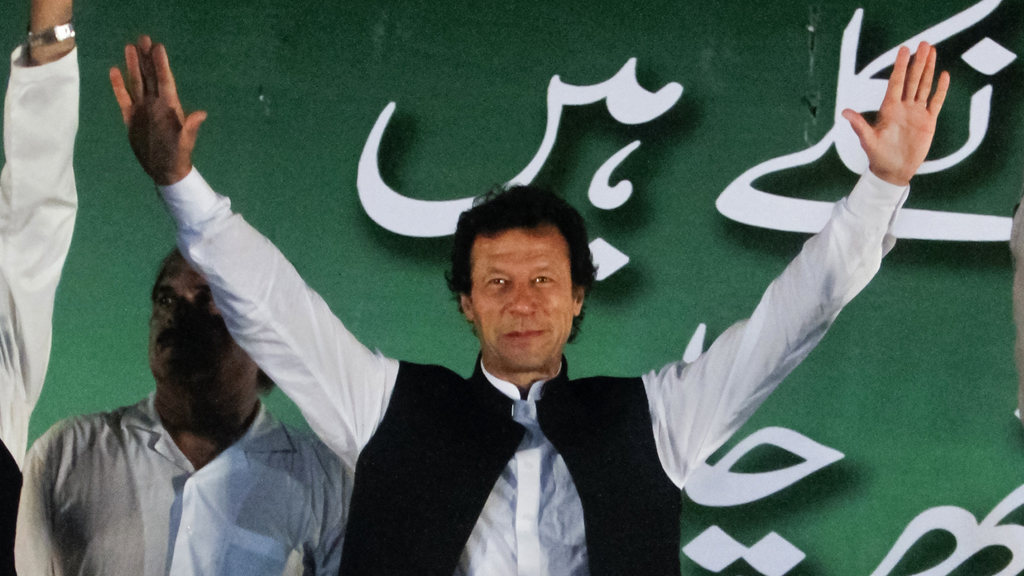Imran Khan calls on US to ‘reveal names’ of drone victims
Imran Khan moves his anti-drone march in Pakistan to 7 October and, speaking to Channel 4 News, calls on the US to “reveal the identities of drone victims”.

Imran Khan, Pakistan‘s most successful cricket captain, now chairman of political party Tehreek-e-Insaf (Movement for Justice), has become the public face of the fight against drones.
He describes the use of American unmanned aerial vehicles (UAVs) in Pakistan, Yemen and Somalia as “immoral and insane” and told Channel 4 News they are a “clear violation of international laws and fundamental human rights”.
He expects 50,000 people to join his “peace march” against drones in tribal Waziristan, now planned for 7 October.
“The people of Waziristan stand isolated, infrastructure has been destroyed, people have been displaced, their children haven’t gone to schools in years and economic activities stand paralysed,” he said.
“We believe that continued reliance on military strategy will push the people of the region towards the terrorists. We want to give hope to the people of region and show the world that the way to win this war is to isolate the terrorists and win hearts and minds of the people.”
We believe that these strikes are killing people indiscriminately. Imran Khan
“In terms of popularity, Imran in Pakistan is the most popular leader and even more popular among youth,” human rights lawyer Shahzad Akbar said.
Mr Akbar, who is fighting for compensation for the families of drone victims, said the anti-drones march is a “show of strong resentment from the people against drones”.
“Imran Khan is taking a large number of people from Pakistan and some foreigners to Waziristan and I think the difference will be that he is making an effort to address the issue segregation of society,” he said.
“People in the Federally Administered Tribal Areas (Fata) think that rest of the Pakistani do not care about their sufferings and the other side of Pakistan lives under the impression that Fata is a lost cause and pre-dominantly militant.
“I think this will be a chance to see beyond prejudices.”

’24-hour threat’
Clive Stafford-Smith, who set up the human rights group Reprieve told Channel 4 News the anti-drones rally in Waziristan was originally “an idea that came from us”.
He said: “What we hope the march will do is to open up Waziristan to the public eye, enabling the world to see the faces of those who live under the 24-hour threat of death by drone.
“”The secretive nature of the drone campaign has made it extremely difficult to have an open debate on this issue.”
‘Drone president’
According to research by The Bureau of Investigative Journalism in 2012 there have so far been 36 attacks by US drones in Pakistan, killing both suspected militants and civilians – some children.
In 2010, which saw a total of 128 strikes, the most active year, Channel 4 News heard from tribespeople who described feeling “panic and terror” as drones made flights over their villages. This fear has intensified as UAVs have moved to the forefront of US foreign policy.
US officials say drone strikes are an “essential element” of their attacks on al-Qaeda militants and their affiliates. A spokesman said they were “the most precise system we’ve ever had in our arsenal”.
But Imran Khan told Channel 4 News: “If the strikes are as accurate as being suggested, the identities of the victims should be disclosed for the world to see the efficacy of the drones in eliminating terrorists. We believe that these strikes are killing people indiscriminately, complete media censorship and non disclosure of victim identities supports our assertion.”
“Obama may not yet be seen as the ‘drone president’,” added Stafford-Smith, “but these are early days – eventually, the horrors of the drone war will come to define his presidency just as much as the horrors of Guantanamo or Iraq did that of George Bush.”
Channel 4 News special report: Pakistan drone warfare